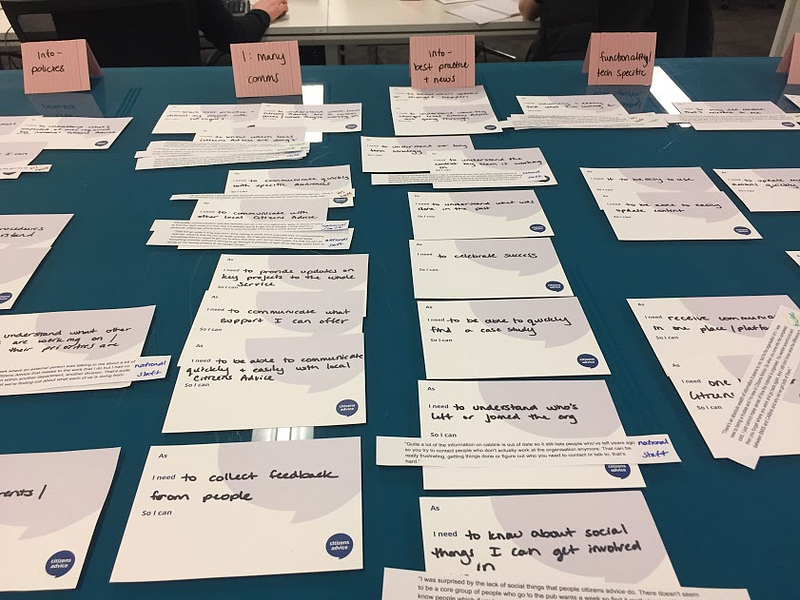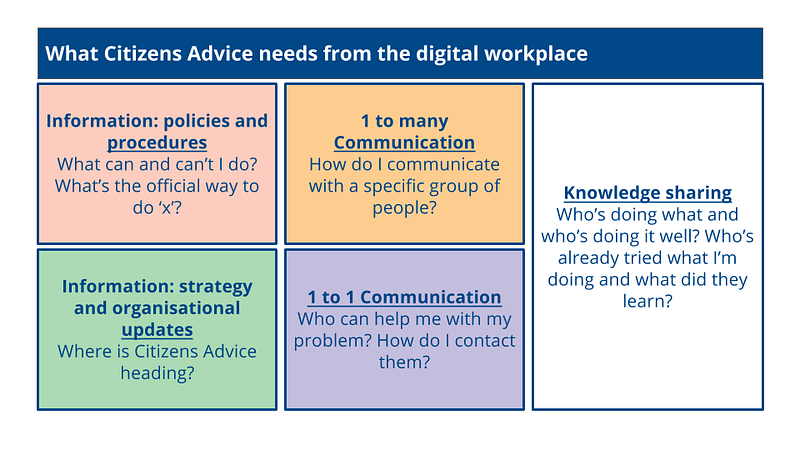What Citizens Advice needs from a digital workplace
Citizens Advice started rethinking the digital workplace at Citizens Advice.
This means we’re taking a step back from our current intranets and exploring how digital can help us work better together.
Understanding what people need
To understand our users, for the past several weeks we’ve been speaking to people at every level of Citizens Advice, including the Witness Service.
We spent time with people in courts and in local Citizens Advice across England and Wales. We spoke to people from Penzance to Northumberland, from Norwich to Swansea.
We went to homeworkers’ houses and ran workshops with staff and senior leaders.
We got a feel for their working environments and talked to them about how they work. We asked questions like:
- What kind of information do you need throughout the day? How do you find it?
- What else do you need to do your job?
- What’s currently getting in the way? What is frustrating?
- In an ideal world, what would make it easier for you to do your job or be an effective volunteer?
Boiling it down into something we can take forward
In total there were 81 different user needs.

We took these 81 needs and grouped them into 5 key areas. This is what we think the digital workplace needs to cover:

The most pressing need is to be able to find things quickly — it cuts across all of these.
The most common thing people talked to us about was having trouble quickly finding what they need — whether it’s information or the right person who can help with a problem.
“It’s a bit like you go down a rabbit hole. When you’re after something you’re just led to more and more pages and it’s just not helpful.” — local Citizens Advice trustee
When people can’t find what they need, their next step is to ring or email colleagues. This came up again and again.
“I use the [intranet] search less and less because I don’t often get the information I need. Which means I then rely on people that I know will have that information for me. So if it’s anything to do with finance, I’ll rely a lot on our finance business partner.” Citizens Advice staff member
‘Human search engines’ and the cost of poor internal search
It’s often hard to find information or people in large complex organisations. But we found that it’s putting pressure on certain people with a lot of organisational knowledge. They become ‘human search engines’ who spend a lot of time referring people across the service.
“Because I’ve been in the organisation [a long time], there are names that I will go to. So that probably isn’t the way it should work because I’m disturbing someone and I know it’s something that has nothing to do with them and I’m hoping they will be able to tell me who I should be speaking to.” — local Citizens Advice CEO
If our digital tools help people find things quicker, people can spend less time finding things (or helping others find things!), and spend more time delivering the best service for our clients.
Part of this is about poor search and too much content. But it’s also about the language we use.
People told us about having to scroll through pages and pages when they put a term into search.
They also told us that our internal jargon is getting in the way.
“There’s a lot of words and I don’t really know what they mean still. Like CMIT I thought was the system and it turns out it’s a team.” — Citizens Advice staff member
Many big organisations have acronyms and phrases that people adopt over time. But if you’re new to the organisation it means having to learn a new language just to get on with your job.
We’ve done a lot of work on our public advice content to make sure it’s accessible and easy for people to understand. Now we need to do the same for the information people need to be part of the Citizens Advice service.
When it comes to sharing knowledge, people need to do this in different ways.
People need to share information and support each other across the organisation. But different groups want to do this in different ways.
For Citizens Advice staff members it’s about understanding what other teams are working on. They want a space where they can browse or search that information and understand whose work might overlap with theirs.
For leadership and staff of local Citizens Advice it’s about best practice and getting peer support around specific issues.
“What would be useful would be to have access to people who have been through similar issues if you have a problem.” — local trustee
The same is true for some of our volunteers who support the running of a local Citizens Advice.
“At that point, the lack of any sharing forum or discussion platforms really got to me because I didn’t want to reinvent the wheel. And I found no way of talking to other bureaux and saying, ‘Have you done this before? Can I save some time and learn something from you?’” — local IT volunteer
So we may need to look at different knowledge sharing solutions to meet these different needs.
Our next steps
The user needs that came from this research were based largely on what’s wrong with our current systems. There could be needs that we’ve missed and that will come up throughout this process.
To explore this, we’ll be holding more workshops with people across Citizens Advice. We’ll:
- Check we’ve got our 5 areas and our list of needs right
- Explore whether there are any needs we might have missed
- Start to talk about solutions that could help us with each area of need
If you’re part of the Citizens Advice service and want to help, get in touch.
And if you’re working on something similar in your organisation, we’d love to hear from you.

